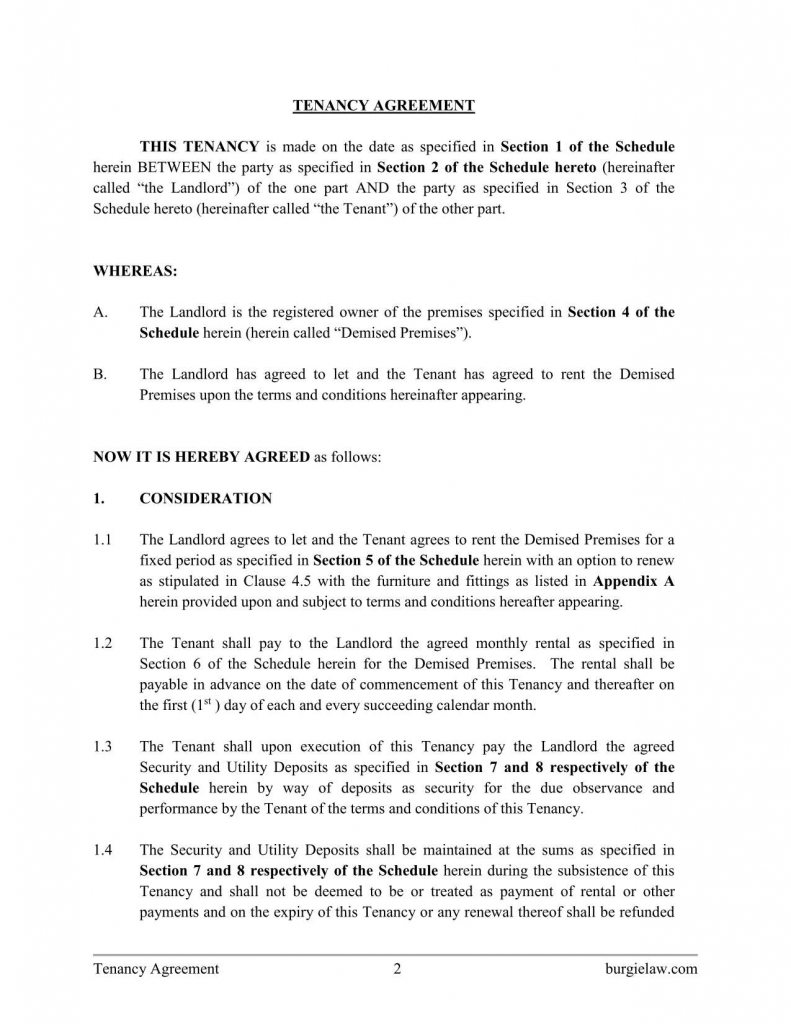Affordable housing has been a significant topic of discussion in Malaysia over the past decade, as the increasing house prices have placed additional pressure on the rental market in the country.
However, navigating rental practices and understanding tenancy agreements in Malaysia can sometimes be perplexing. To address this complexity, here’s a comprehensive guide that sheds light on tenant rights and clarifies the role of rental agreements in Malaysia.
What Are Your Rights As A Tenant?
Tenant rights in Malaysia present a complex scenario as there is presently no dedicated legislation governing rental agreements. However, efforts are underway to conduct a study that aims to introduce the much-awaited Residential Tenancy Act in the coming years. The purpose of this act is not only to safeguard the rights of tenants but also to establish a fair market environment for landlords.
The rights and responsibilities of tenants and landlords in Malaysia are influenced by various laws. These include the Contracts Act 1950, which addresses conflicts arising from tenancy agreements, the Civil Law Act 1956, which covers payment disputes, the Distress Act 1951, which pertains to matters of eviction, and the Specific Relief Act 1950, which prohibits landlords from evicting tenants or denying them access to the property without a court order. Additionally, rental disputes are addressed within the framework of Common Law or Case Law.

These laws collectively impact the legal landscape surrounding tenant and landlord rights in Malaysia.
It is important to highlight the definition of a tenancy under the National Land Code, as it has a significant impact. According to this code, any rental agreement lasting less than three years is considered a ‘tenancy’ and does not require registration. On the other hand, a lease for a duration exceeding three years is technically classified as a ‘lease’ and necessitates registration.
Given these complexities, it becomes crucial to take steps to protect yourself. One effective measure is to establish a tenancy agreement. This agreement serves as a solid starting point in safeguarding your rights and outlining the terms and conditions of the tenancy.
Here are more details of the tenancy agreement, and a tenancy agreement sample below:

A rental contract of this nature outlines the mutually agreed-upon terms and conditions between the landlord and tenant at the beginning of a rental period. It is a crucial document that ensures both parties have a clear understanding of their responsibilities and that their rights are protected.
While the provided sample rental agreement offers a general template, the specifics of the agreement are ultimately determined by you and the landlord. This can include standard clauses such as rental cost and duration, as well as more specific details like whether your pet goldfish is allowed or if you have the freedom to decorate your bedroom.
Landlords or letting agencies often provide existing tenancy agreement templates, but don’t hesitate to request additional clauses if you wish to formalise specific discussions or agreements. It is also essential to thoroughly inspect the property before signing the agreement. By accepting the property in its current condition, you can avoid potential charges for damages or issues that may have been overlooked initially, such as a broken air conditioner.
Taking these precautions and ensuring clarity in the tenancy agreement can help establish a transparent and harmonious rental arrangement for both parties involved.

When reviewing a rental agreement, it’s important to pay attention to the following key aspects:
- Monthly rental fee
- Duration of the rental agreement
- Penalties for late payments
- Terms and conditions regarding changes to the rental cost
- Terms and conditions related to the duty of care
- Allocation of repair costs
- Terms and conditions regarding the return of deposit(s)
- Terms and conditions for subletting or adding additional tenants
- Obligations for utility bills and property taxes
- Special clauses covering pets, smoking, and access to amenities
If you have any doubts about your rights or responsibilities, it is advisable to have a lawyer review the rental agreement. Although there may be costs associated with this, it can potentially save you from more significant expenses in the future. Additionally, obtaining legal stamping for the agreement is crucial.
Early Termination Of Tenancy Agreement In Malaysia
Early termination of a tenancy agreement in Malaysia can be a complex matter. It’s important to understand the following key points:
- Contractual Obligation: If you sign a two-year rental agreement and decide to cancel after one year, you may be held liable for the remaining 12 months of rent. According to current contract law in Malaysia, you are obligated to fulfill the terms of the original tenancy agreement.
- Change of Ownership: In cases where a rental agreement is registered as a lease, if the property is sold, the new owner becomes automatically bound by that agreement. However, complications can arise if the property is rented for less than three years and the new owner claims no knowledge of the rental agreement. In such cases, the buyer may have the right to remove the tenant.
To avoid potential issues, it is advisable for the original owner to include specific terms in the Sale and Purchase Agreement that allow the tenancy to continue until its agreed-upon duration. This can help mitigate problems related to a change of ownership.
Navigating early termination and change of ownership scenarios requires careful consideration and legal understanding to protect the rights and interests of both tenants and landlords.
What Your Landlord Should Expect Of You
It’s important to remember that landlords have their own rights as well. While specific rights may be outlined in the rental agreement, the general expectations of tenants regarding their duty of care and respect for the property can be summarized as follows:
- Timely payment of rent: It is expected that tenants will make prompt and regular rental payments as agreed upon.
- Vacating the property: At the end of the tenancy, tenants are expected to leave the property as specified in the agreement.
- Duty of care for property maintenance: Tenants have an obligation to maintain the property in a decent and acceptable condition during their tenancy.
- No unauthorised renovations or alterations: Tenants should refrain from making any changes or modifications to the property without the landlord’s permission.
- Payment of relevant bills: Tenants are responsible for paying all applicable bills, such as utilities, as specified in the agreement.
- Returning the property in its original condition: Tenants should aim to return the property in the same condition it was received, considering reasonable wear and tear.
These expectations help establish a respectful and responsible tenancy, promoting a positive landlord-tenant relationship.
Your Obligations As A Tenant
As a tenant, your obligations extend beyond financial responsibilities. While it’s true that timely rent payment is crucial, there are other obligations to fulfil in order to maintain the property and comply with tenancy agreements. Some of these responsibilities include:

- Payment of deposits: You are typically required to pay relevant deposits at the start of the tenancy, as specified in the agreement.
- Timely rent payment: It is important to pay the rent on time as agreed upon in the tenancy agreement.
- Reporting necessary repairs: You have a duty to promptly notify the landlord or property manager of any repairs or maintenance issues that require attention.
- Maintaining cleanliness and safety: You are responsible for keeping the property clean and safe during your tenancy, ensuring it is well-maintained and free from hazards.
- Compliance with laws and statutes: It is your commitment to adhere to relevant laws and regulations while residing in the rental property.
- Payment of utility bills: As specified in the agreement, you are responsible for paying utility bills associated with the property.
- Seeking permission for new tenants/subletting: If you plan to bring in new tenants or sublet the property, it is essential to obtain permission from the landlord or property owner, as stated in the tenancy agreement.
By fulfilling these obligations, you contribute to a harmonious tenancy experience and maintain a good relationship with your landlord.
Rental Fee And Costs
When renting a property, it’s important to consider the rental fee and associated costs. Apart from the monthly rent, you will typically need to provide additional deposits or booking fees. Here are some key points to keep in mind:

- Security deposit: This is a substantial upfront amount, usually equivalent to two months’ rent, which serves as a security against potential damages caused to the property during your tenancy.
- Earnest deposit: This is another fee worth noting. It is typically priced at the amount equivalent to the first month’s rent and acts as a holding fee to secure the property and prevent the landlord from renting it out to someone else. It should be paid to a reputable agent who acts as a neutral third-party holding the fee.
- Utility deposit: A utility deposit may be required to ensure payment security for any unpaid utility bills at the end of the rental agreement.
- Stamping fees and administrative charges: These fees cover the legal review and stamping of the rental contract agreement, indicating that a lawyer has reviewed and certified the tenancy agreement.
It is important to clarify with the landlord or agent who bears the responsibility for these fees. In some cases, landlords may shift the obligation to tenants. Typically, legal fees are paid by the landlord, while stamping duties are paid by the tenant.
Understanding these fees and their respective obligations will help you navigate the rental process and ensure transparency in financial matters.
| Annual rent value | Legal fee |
|---|---|
| Up to RM10,000 | 25% of monthly rent |
| RM10,001 – RM100,000 | 20% of monthly rent |
| > RM100,000 | Negotiable |
Stamp Duty
| Rental term | Stamping fee (calculated for every RM250 in excess of RM2,400 annual rent) |
|---|---|
| Up to 1 year | RM1 |
| 1 – 3 years | RM2 |
| > 3 years | RM3 |
What Happens In A Tenancy Dispute
Establishing good communication is crucial in preventing disputes between tenants and landlords. It is essential to maintain honesty and openness when dealing with your landlord or their letting agent.
If accidents occur or issues arise within the property, it is important to promptly inform your landlord. Similarly, landlords should keep tenants informed about any problems or planned repairs within the premises. They should provide advance notice and not assume that tenants would be comfortable with random service providers arriving unannounced.
These examples highlight the significance of effective communication. Engaging in discussions should always be the initial approach to resolving disputes. In many cases, a verbal agreement can be more effective in resolving problems than resorting to legal action.
Additionally, a well-drafted tenancy agreement with clear terms and conditions can help address and prevent disputes. It serves as a reference point for both parties to understand their rights and responsibilities.
By prioritising open communication and having a comprehensive tenancy agreement, tenants and landlords can foster a harmonious and cooperative relationship, minimising the chances of disputes.
Common Legal Problems For Renters
One of the most common legal challenges faced by renters pertains to the early termination of a rental contract, as previously discussed.

It is important to reiterate that terminating a rental contract agreement prematurely may result in the tenant being held liable for the full rental payments due for the remaining term of the contract.
Likewise, early termination by the landlord is another common issue that should be addressed in the tenancy agreement.
It is crucial to understand that it is unlawful for a landlord to evict a tenant without a court order, as stipulated in the Specific Relief Act 1950. This legal protection extends to situations where the landlord renders the property inaccessible by changing the locks.
However, it is essential to note that failure to pay rent on time or causing damage to the property can trigger a termination clause outlined in the agreement. In such cases, the landlord can serve a payment notice and proceed with eviction if the tenant fails to comply. It is important to recognise that the eviction process can be lengthy and costly for the landlord.
Having a clear understanding of the legal aspects surrounding termination and eviction enables tenants and landlords to navigate these situations while upholding their respective rights and obligations.
Tenant Do’s and Don’ts
With all the considerations you need to make as a tenant, let’s explore a quick reference list of Do’s and Don’ts to help you through.
| Do | Don’t |
|---|---|
| Check a property thoroughly before renting | Agree to a verbal contract |
| Check and sign a tenancy agreement | Miss rental payments |
| Discuss terms of return of the deposit | Sublet part/all of the property |
| Pay rent on time | Ignore repairs or problems |
| Maintain property at a good standard | Damage the property |
| Report any faults or repairs | Breach your rental agreement |
| Pay utility bills on time | Renovate or alter the property |
Disclaimer : The information provided on MyPropertyPlaces.com is intended for general informational purposes only. We do not make any representations or warranties regarding the accuracy, reliability, or completeness of the information. The information is provided “as is” and without warranty of any kind, including but not limited to fitness for a particular purpose, to the fullest extent permitted by law.
While we have made efforts to ensure that the information provided in this article is accurate, reliable, and complete at the time of writing, it should not be solely relied upon to make any financial, investment, real estate, or legal decisions. It is important to seek advice from a qualified professional who can consider your specific circumstances and provide personalised guidance. We assume no liability for any decisions made based on the information provided.



